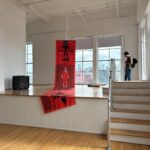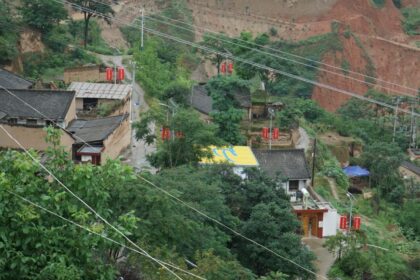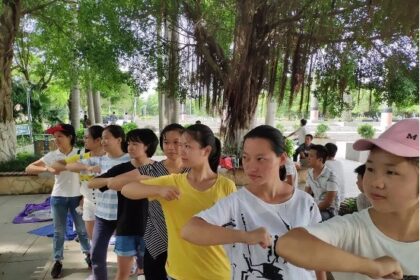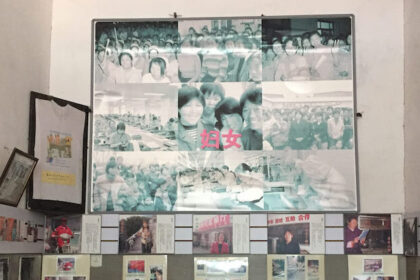Migrant Workers Video Collective: An Interview with Song Yi
Interview by Yuxiang Dong and Yanhua Zhou
This interview took place on December 12, 2022, through the platform Tencent.
Song Yi, curator, writer and filmmaker. He is the co-founder of the Migrant Workers Video Collective, co-director of art space Institute For Provocation, and founder of “Bloom绽”, Curating Collective for Contemporary and Urban Planning. He is also the senior editor of LEAP magazine and former Head of Exhibition at the Long March Space where he coordinated the “Ho Chi Minh Trail” project.
Dong: To begin with, we are curious about when and why Picun attracted your attention. When was your first visit? What activities did you participate in during your time there?
Song: It has been more than ten years, and now I think that my encounter with Picun is to some degree inevitable because of the general atmosphere of the place where I used to work. In 2009, I heard of Picun for the first time. At that time, I was working for the Long March Space (长征空间) in Beijing. When the Long March Space was first initiated as the Long March Project (长征计划) in 2002, it was involved with left-wing history. Following the 2007 and 2008 financial crisis, all art institutions in the 798 basically had nothing to do, or any exhibition to hold in 2009.[1] Therefore, we intended to invite some friends to do some activities in our space. One of them was Zhao Chuan, a theatre director from Shanghai. At that time, he happened to be organizing a nationwide field maneuver, including a play called The Little Society.[2] They were talking about organizing some activities and discussions at the Long March Space. When they came, Zhao Chuan told me that they had a show of The Little Society in Picun the day before and introduced me to Picun’s Culture and Art Museum of Migrant Workers and New Workers Theater. My first encounter with Picun was through Zhao Chuan and I found it very interesting at that time.
In the fall and winter of 2010, the Ford Foundation commissioned the Long March Project to conduct a research project. The research subjects included the Migrant Workers Home in Picun (a Beijing-based grassroots organization supporting migrant workers). Therefore, I went to Picun and had some direct connections to get further information and got to know two of the founders Sun Heng and Xu Duo. They were also invited to a forum that we organized later, which deepened my understanding of Picun. A more comprehensive insight came in 2013. At that time, Professor Lu Xinghua (陆兴华) at Tongji University (同济大学) invited Jacques Rancière to visit China. I was working for the Leap (艺术界) magazine at the time. My job was to cover Rancière’s trip with some reports for the magazine. During the trip in Zhejiang and Shanghai, discussions and debates happened mostly in schools. I did not think they were interesting perhaps because of the ivory tower of academia. I introduced the Migrant Workers Home in Picun to Rancière and Lu since they were related to Rancière’s research and writing. They thought this was a good idea and agreed to pay a visit. There were some interesting debates that night. Rancière did not talk too much. He was mainly listening.
After that, my colleague at Leap magazine suggested that I should edit a special issue about Picun. I felt that editing the special issue was a good opportunity to learn more about Picun. I asked Xu Duo who I should talk to regarding literature and art in Picun. He recommended Wang Dezhi. This is how I got to know Wang and the Spring Festival Gala for Migrant Workers that they organized in 2012. Wang was the director of the gala. I remember that Sun Heng gave me a DVD of the gala. I watched it and thought it was interesting. So, the gala became the main topic of my interview with Wang. This was how everything started.
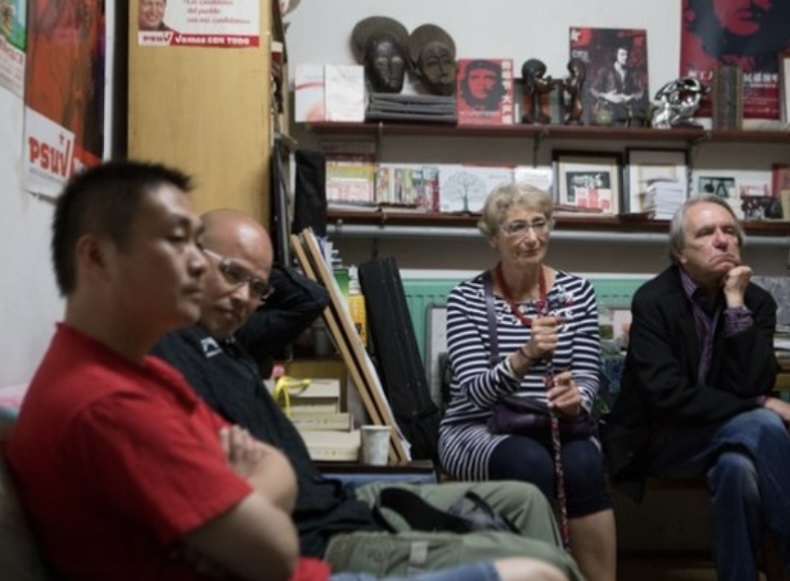
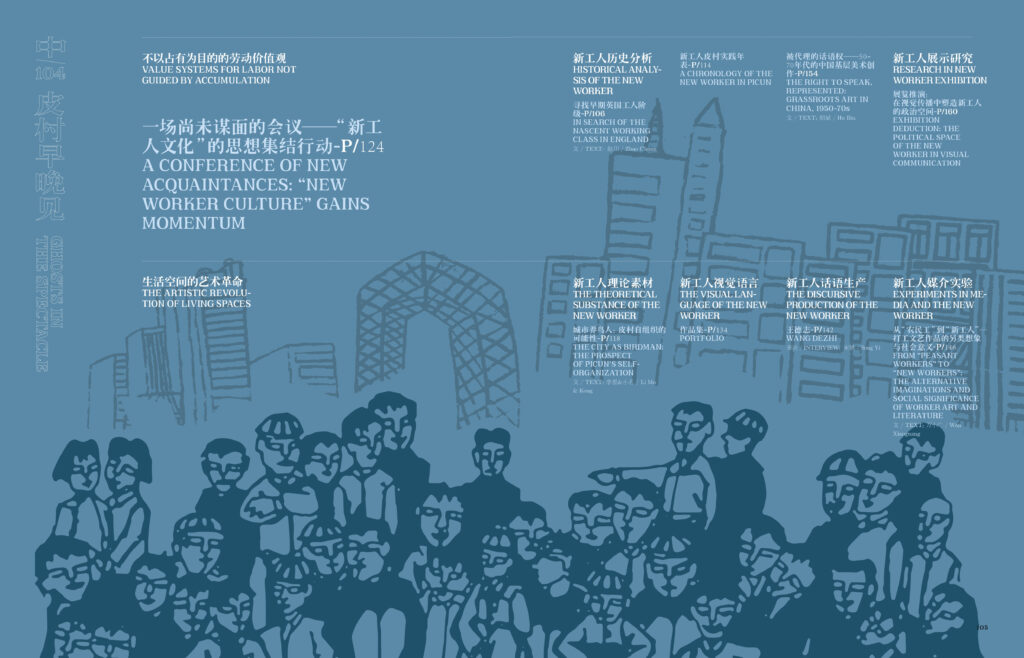
Dong: What is the most attractive characteristic of Picun and Migrant Workers Home for you?
Song: I think there might be two aspects: first, from my personal perspective, learning about Picun was the starting point of establishing contact with the real grassroots society in China. Before that, I was just a college student and then found a job with limited connection to the broader society. Even though I was working in the art industry from 2008 to 2010, I still did not have any chance to learn about Chinese society directly. Thus, one reason why Picun attracted me is that it helped me learn about the reality of this society. Second, I was greatly moved by my friends in Picun while collaborating with them. For example, I think Wang Dezhi is a talented artist and has the ability to teach himself. This was interesting and inspiring, and attracted me. I remember that when we talked about films in our first conversation, he used his own life experiences and social imagination to interpret films. For example, his interpretations of Bicycle Thieves (Ladri di biciclette) (1948) involved more social care and awareness of social problems, making his interpretations more profound.
Dong: When did you start the Migrant Workers Video Collective with Wang Dezhi? Was there a specific background? What was your goal of establishing this group?
Song: I learned a lot after the first conversation with Wang Dezhi. I often took friends to visit the Culture and Art Museum of Migrant Workers and had conversations with Wang. I would also invite Wang to join some activities in the art circle. It was like this for many years. Until about 2015 or 2016, Wang told me about the idea of the Migrant Workers Video Collective to make films together. They already made some films in the past but wanted more people to join. This was appealing to me because it was a very natural process. My very first interaction with Picun was not about art projects. Curiosity and friendship played a very important role. I just thought that we could make some films together without thinking too much while starting the collective. I loved how natural this process was. I believe the mission of this group never changes, from Wang Dezhi’s perspective either, that is to speak for the group of migrant workers. Reports about this group of people in mainstream media are usually stereotypical. Several good films and documentaries are not from the (social class) perspective of migrant workers. Instead, they were from a rural or grassroot point of views. I think the sense of reality is always important, including exposing contradictions that migrant workers have confronted. These contradictions are important because they collectively form our cognition of this society. “Social cognition” sounds pretty vague, but it can be sensed when we reflect on specific information, such as some incidents or people’s reactions.
Dong: Besides you and Wang Dezhi, members of this group just came and left in these years. Why did they leave? Did they just leave Picun for other jobs, or something else?
Song: Yes, this was the main reason. Wang and I are the core members of this group not only because we are the co-founders, but also due to our similar life situations. Wang is relatively stable as a member of the Migrant Workers Home. For me, life is not too stressful. But most of our worker friends, especially those who have left, are the new generation of migrant workers. They were born in the 1990s, or the end of the 1980s. They came to the big city from the countryside and joined the collective. Their lives are much more stressful with more burden than ours. Our group is not a profitable business, so they only spent part of their spare time here. Other worker friends’ participations are even looser rather than institutionalized filming, performing, and other activities.
Dong: Was there anything or anyone particularly unforgettable for you during the process?
Song: Sure, there were many unforgettable things and people. Wang Haijun was with us for the filming of Bachelor Self-Camera in Paradise (直播梦蛇). I have always liked him because there is something pure and honest about him. I am happy when I feel this simplicity while working with migrant workers. Wang Dezhi has this trait too. I guess this is why we are friends for many years. This trait has different manifestations in different people. For example, I can feel the idealism in every conversation with Wang Dezhi. This is how the simplicity works for him. For Haijun, it is his purity and honesty when dealing with people. This applies to other worker friends too. Even though we are no longer in the same city, sometimes we still talk and feel nostalgic about the times when we worked together on film productions. These things do not seem to be significant, but the friendship between us is worth remembering, the same feeling with my university classmates. It is plain, nothing too significant but you often think about it. Some other work friends in the Picun Literature Group also left a deep impression on me. Everyone has strong and unique characters and is lovely. Their self-expressions have unique styles in writing and performing. However, it is a pity that further developments of their self-expression into aesthetic expression are suppressed by their living situations.
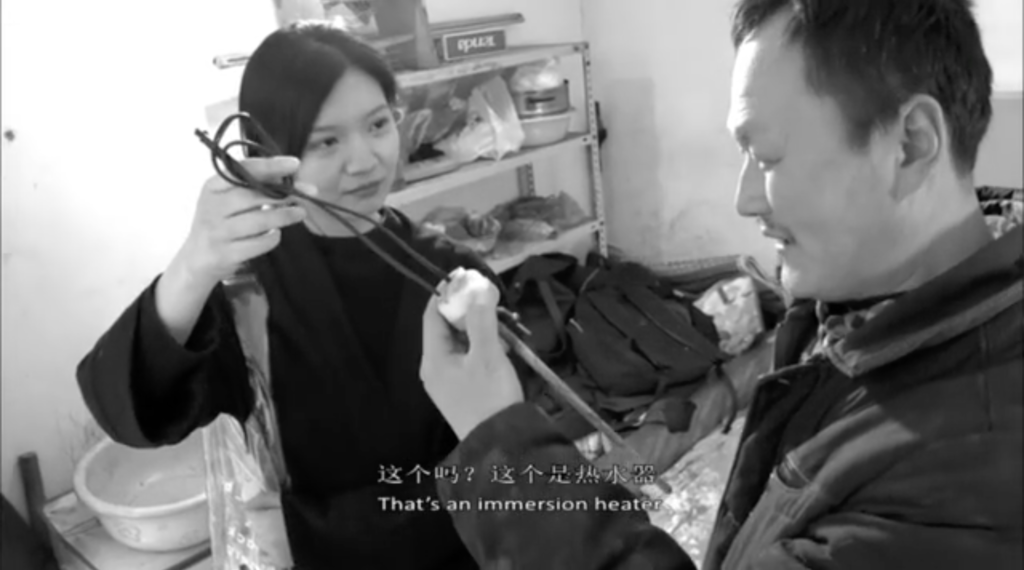
Dong: When the Migrant Workers Video Collective was founded in 2017, how did the fire accident in Daxing influence you personally, as well as the Migrant Workers Home and the Migrant Workers Video Collective?
Song: In fact, I asked Wang Dezhi similar questions. Social incidents had a greater influence on me than him. Wang Dezhi is a migrant worker who came to Beijing from the countryside to work but also achieved self-growth. There is something significant almost every day that stimulates him. The overstimulation already made him feel nothing. The fire accident in 2017 hurt me profoundly. This incident was especially bad for this group of people (migrant workers) in terms of policy. I did not go to Daxing at that time, but I went to a wholesale clothing marketplace near the Beijing Capital International Airport to take videos of the eviction. I felt that this situation was stung my heart, and I became more empathetic. There was another transition that maybe needed to be examined with a long-term perspective. At the time, I was working at the Long March Space. But the institution had little resonance with me emotionally or psychologically, even though it had a left-wing historical complex. However, I felt more empathy when I was filming and communicating with people in Picun. I do not think this connection can be built by discussing left-wing theories. Instead, you have to find it in people’s concrete emotions in their real lives. Of course, the fire accident and the eviction in 2017 was a big motivator. I used to tell my friends that I did not focus on social engagement when I started working in the art industry. I was more into elitist art, caring more about the exquisite language of art. However, I came to realize that I gradually and unconsciously got closer to social events or the macro scale of the society. Now it has been over ten years, and my opinions about art have drifted away from colleagues who I used to work with in art galleries. It just happened slowly and naturally that my opinions on art and understanding of society became increasingly different from my previous experiences. For me, 2017 might not be the core force, but it was a turning point for me, perhaps because it exposed something violent to me flagrantly, or it demonstrated how desperate people were looking for help.
Dong: In your opinion, what was the relationship between the Migrant Workers Home, local residents, and the government when you were working there?
Song: There are different aspects of your question. From what I saw, for Picun’s residents, the Migrant Workers Home was more like a square for them to dance together, since there was a yard for square dancing. Many residents probably had no idea about the Migrant Workers Home, but they did know about the “the dancing place,” the “secondhand clothes store,” and the “school in the village.” There was a Tongxin Experimental School, an elementary school for migrant workers’ children, which is closed now. A small number of worker friends might have been attracted to and are interested in the Migrant Workers Home. They know about the labor union and activities here. Fewer of them take a further step to join the literature group and learn much more. Thus, the relationships between local residents and the Migrant Workers Home can be divided into different levels, depending on the individual’s involvement.
For the villagers’ committee (the village’s local government), the Migrant Workers Home is a sensitive issue because they are famous. The village committee does not want the Migrant Workers Home to stay around, as they believe that they might be criticized by the superiors if the Migrant Workers Home gains too much attention. For a broader sense of government, I think there is a change over time. About ten years ago, when I just got to know people in the Migrant Workers Home, there were some people in the government who still had the red memory – in other words, who cared about the tribulations of the masses. They had a good relationship with Picun. And this kind of people in the government actually still exists today. But there are also some people in the government who are quite vigilant towards the rights and union of the new workers. In order to survive, they have to make their superiors believe that they are loyal, at least superficially. This is my understanding. Finally, in terms of the theoretical resources, I think the Migrant Workers Home certainly tends to agree with the theoretical legacy of Mao Zedong. To put it simply, they felt much closer to the political thoughts that dominated the first thirty years of the PRC.
Dong: Currently, how did the pandemic affect you, the Migrant Workers Video Collective, and the Migrant Workers Home? I heard that you left Beijing. What did it mean to the Migrant Workers Video Collective? How can you maintain the group’s activities?
Song: Due to the pandemic, I barely stayed in Beijing, nor had any in-person conversations with Wang Dezhi. I will go to Beijing next month and talk to him based on my current plan. Since the outbreak of the Covid-19, although the quantity of our video productions remains the same, the energy of the group is actually reducing. There are many reasons for this, including the fact that many of our worker friends already left and we do not have much time to get together anymore. Before the pandemic, we used to have lots of activities. Even in 2019, for example, the literature group still held events every week. We could still often gather together. After the pandemic, many worker friends went back to their hometowns and probably just stayed with their families or were in quarantine. There was much less opportunity for us to meet and gather. In addition, in terms of the Migrant Workers Home, Sun Heng and Xu Duo used to live in Picun. Currently, they are mainly writing songs for villages throughout the country and have to be away in different countryside. Wang Dezhi has to take full responsibilities of the survival of Migrant Workers Home in Picun and its literature and art initiatives, as well as running the charity stores. He does not have enough free time to film or have discussions. I left Beijing also because the art institution I work for has no income at all now. It is impossible to be sustainable due to the expensive rent and other costs in Beijing. I decided to come to Guangzhou and see how things are going. I am looking for opportunities to continue filming and working here, seeking a transition. At this crucial point, I think I will keep running the Migrant Workers Video Collective, but it is also the time to make changes.
Dong: You enter Picun as a curator or documentary director to interact with worker friends and produce films. Meanwhile, worker friends enter the circle of intellectuals and artists, which generate the discussions you talked about. What is your role during this process? Are you a person who facilitates and stimulates the conversations?
Song: I think I am. And this role is of great importance. For example, we made a documentary of a workshop about gender. If I did not raise the questions, people may not realize the problems. There was a worker friend in the documentary, I questioned him for many times about the first version of his poem because I thought there was not enough empathy for women as he complained a lot about the bad temper of his wife. I hoped that he would rewrite the entire poem. However, instead of asking him to rewrite directly, I asked him questions: does your wife really have a bad temper? Is she angry all the time? He thought a little bit and said no. I kept asking: when does she not have a bad temper? He thought about it for a while and realized that what he had written was not true. After recalling many other things, he started rewriting. And the result of the rewriting is an expansion from a poem to a long prose. Thus, I believe this kind of stimulation is not hard. We should make it happen and extend its impacts. We also have to be aware that just one thing will not make a big difference. Nonetheless, I think we should do it because it is a meaningful thing. About the results and impacts, they can hardly be predicted or traced.
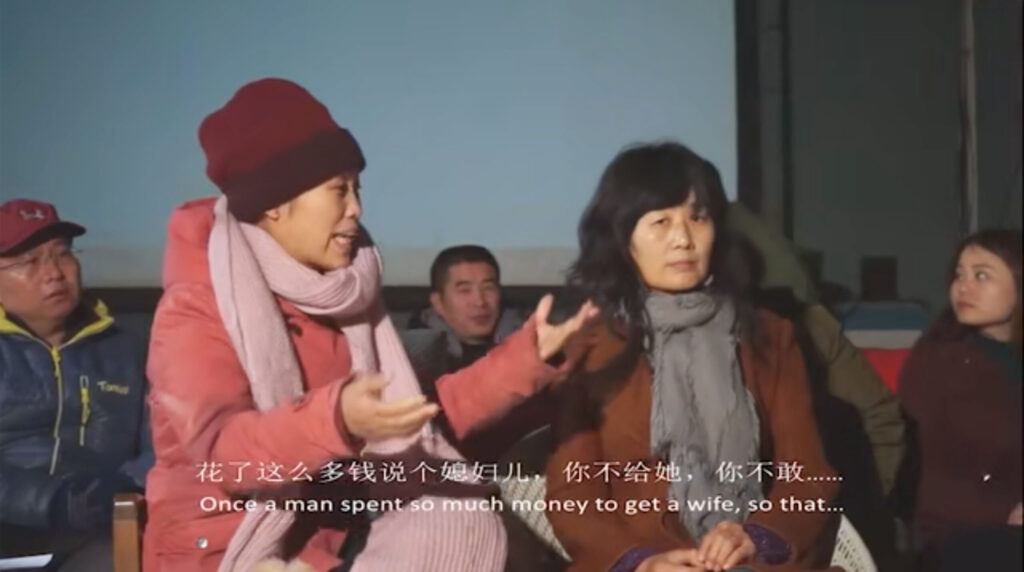
Dong: Besides the workshop you mentioned, there was also a category called “Marriage and Housing” (婚恋和住房) in the works by Migrant Workers Video Collective. Were there any other manifestations of gender, marriage, and housing issues in Picun? There are also some other categories, such as work (工作), daily life (日常生活), children (儿童), and struggles (斗争), among others. What are your considerations of these categorizations?
Song: I think a specific manifestation is that the discussions about gender among intellectuals and people in the art industry are more open. However, in the group of migrant workers, the issue of gender is usually a problem more directly related to the material. This problem is not difficult to understand because it is too omnipresent and influential. Why I combined marriage and housing? I think it was because conflicts and misunderstandings about gender today were largely originated from buying houses or betrothal gifts, which twisted people’s understanding of each other’s situations in society, both men and women. It is a small problem, yet extremely difficult to solve. Marriage means buying a house. Self-built houses in the countryside did not even count. It has to be an apartment in a town at least, which costs hundreds of thousands of Yuan. Once this trend became popular, it caused misunderstanding. some men believed that women only want the material. And women’s prejudice against men grew simultaneously. Marriage and housing are key problems to enter when talking about gender issues among migrant workers. There are some other related problems like male chauvinism. This seems to be ridiculous to intellectuals and artists, as they do not believe so. Some would even laugh at the male chauvinists. The situation may improve in younger generation. However, male chauvinism persists in rural areas and are very influential especially within the older generations. Anyway, that is another issue. As for categorizing, I think it just happened as our video production grew. I did not try too hard for categorization. The reason I like these categories is that they were not based on a priori knowledge – they might be related to something that both Wang Dezhi and I care about – but they were generated naturally. Therefore, I believe the categorizing is directly correlated to the problems of migrant workers.
Dong: Bachelor Self-Camera in Paradise focuses on a story about a female artist and a male worker who is an exhibition installer. In addition to gender issues, another interesting point is that because of the Migrant Workers Home, two different forms of labor, physical and intellectual, co-exist in Picun. What do you think about the two forms of labor?
Song: I do not think there is a conflict, merely a difference. It is fine to have differences as long as there are conversations and discussions. In recent years, discussions might sometimes have to pause due to the pandemic. I think it is good to put intellectuals and migrant workers together in one place. Maybe there is something ironic in the film, but it is not out of malice but rather interesting. I believe it is good to have a relatively stable place for intellectuals, artists, and migrant workers to get together and have conservations. In my experience, writings of migrant workers who used to participate in the activities of the Picun Literature Group are much better than the those written by the migrant workers in Guangdong. I said “much better” because of the level of cognition, self-awareness, and aesthetic expression. Some average works we read in the literature group are still better than many works by migrant workers in Guangdong. I think it is due to the process of accumulation. It has been more than three or four years since the establishment of the Picun Literature Group. Even though some worker friends thought their works were not so good, their progress were quite apparent over a longer period. If we compare their works to other migrant workers’ works, the difference is obvious. I do believe the collaboration between intellectuals, artists, and migrant workers is important and can make a difference.
Zhou: I noticed that the Picun Literature Group has a very close connection with some universities and research institutions in Beijing. There were activities every week before the pandemic. For example, the literature group would invite some professors to give talks and lectures. Do you think these activities influenced the creative activities in the literature group? If so, to what extent?
Song: There were certainly some influences. In the beginning, I thought lectures were too much of a one-way communication. Maybe there should be more ways for the Migrant Workers Home to express themselves. That was why I started a workshop to discuss their writings. Of course, I also had higher expectations for the activities we organized. Even so, there was still a big influence on the literature group. As I have talked about, many worker friends improved a lot since they joined the group. Their works also stands out compared to works by other charity organizations in Guangzhou. We do have to admit though that charity organizations in Guangzhou primarily focus on defending migrant workers’ rights more than literature and arts.
Dong: Some early works of the Migrant Workers Video Collective were made by Wang Dezhi. He also made many documentaries and feature films after settling down in Picun.
Song: Yes, there are also crosstalk and sketch comedy videos.
Dong: Are there any differences between his independent works and works made in collaboration with you?
Song: There are some differences. Wang Dezhi hopes that our films can be shown in more documentary film festivals. He also wants the storytelling to be accessible and acceptable. So, for his earlier works, some people thought that the performances in some feature films were too stereotyped. I think it was fine as we can still appreciate oil painting while enjoying comics. Also, these films represent migrant workers’ willingness to express themselves. However, I want more information in the films, more space to illustrate paradoxes and conflicts. So that I think there is a greater sense of reality. This makes the film less focused, which means our films are far away from a standard documentary. So, there are some differences between Wang Dezhi’s own works and our collaborative works.
Dong: Films produced by the Migrant Workers Video Collective were screened in several different public spaces, such as schools, warehouses, bookstores, and art institutions. Why did you decide to bring problems to such a variety of public spaces? Did the feedback to the same problem change according to the locations?
Song: In addition to public screenings, there were also some private showings. For example, when making the sequel of After Us, the Deluge, we tried to show the film in the families where we had filmed in the past. We have to self-market our films as no platform is willing to show them and we try our best to find places related to migrant workers’ lives. I believe this is the best solution, as audiences will be touched by the environment while they are watching the film. Screenings in other locations, like art spaces and bookstores, were primarily from my friends’ invitations. I just try to show our films as much as possible.
There were lots of differences in terms of feedback. Reactions of intellectuals and artists were often the same, and they tended to reflect on the issues they saw in the films. But for worker friends, there was a resonance. For example, during the first screening of After Us, the Deluge, many migrant worker mothers were deeply touched. After the emotional expression, many of them said that this film should be shown to Xi Jinping in the hope of a change of government policy. Some workers – maybe only a small number but their opinion could be representative – claimed that they did not care much about any benefit in the city, as they came here merely to make money without the intention to have a home in the city and would return to the rural home. I think this kind of opinion demonstrates a little bit limited sight. Other worker friends did not agree with this opinion either.
For me, all kinds of feedback are predictable and understandable since I have been doing this for a long time. The most important thing is to have discussions happen. People need to express their ideas in order to be heard and to let others know their thoughts for different opinions to be discussed. In our daily life, different opinions can hardly emerge because there are many things that just erase the problems.
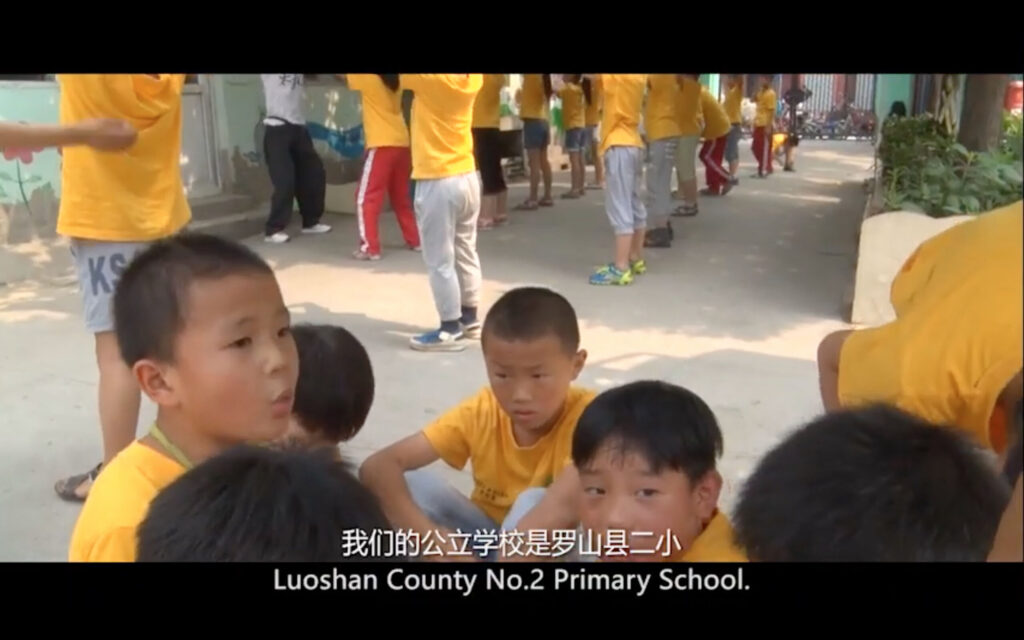
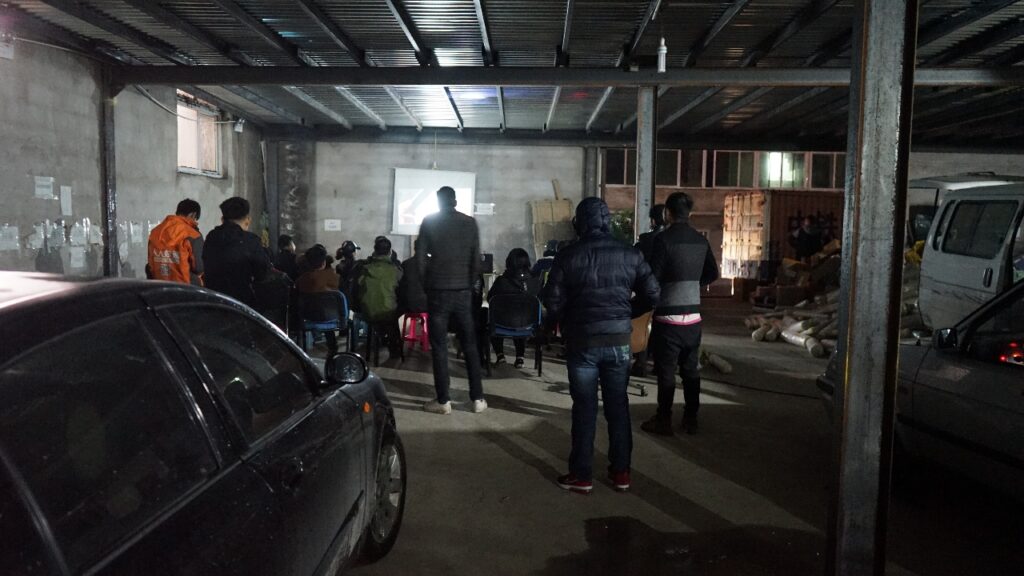
Dong: I certainly believe these films can facilitate some discussions. It is not a difficult thing. Nevertheless, I think these conversations are still limited to certain groups of people.
Song: There are absolutely some limitations. However, I think everyone’s situation is different. Both some artists and ordinary people can understand and accept works by migrant workers. We should have more and further discussions because conversations and connections are not adequate now. What we can do to is to have conversations across social classes and different fields. Art itself is in the same status of communicating with other disciplines. For example, some scientists do not want to have any conversation with you, while other scientists are really into art-related topics. At least we have a much better technical condition today. Twenty years ago, if I were interested in a director who made documentaries about migrant workers, I basically had no way to learn more. Technically, it improves a lot. So, I think there is much more we can do today.
Dong: Are you still pretty optimistic about conversations and discussions across different social identities and classes?
Song: I am not sure if I am optimistic or pessimistic. I just think there should be more. The point is that it is not that hard to have conversations. It is not because of any significant obstacle that they do not happen more frequently. The difficulty is the limited opportunities to make them happen. The main obstacle is different background knowledge between people. I never think about it from a optimistic or pessimistic perspective. I think we can do it and it is a good thing.
Dong: These are all my questions. Thanks for your time, Mr. Song.
Zhou: Thank you, Mr. Song.
Song: thank you.
Translation by Ningxin Chen, Sichuan Fine Arts Institute
Notes:
[1] 798, namely the 798 Art Zone (798艺术区), is a decommissioned military factory complex. With unique postindustrial architecture, the area houses a prominent contemporary art district in Dashanzi, Chaoyang District, Beijing. Some major institutions and galleries in the art district include the UCCA Center for Contemporary Art, Long March Space, Pace Gallery Beijing (2008-2019), among others.
[2] In 2005, Zhao Chuan (赵川) founded the theater collective Grass Stage (草台班), which is committed to creating plays that reflect on important social issues, promoting “social theater,” and building non-profit public space. The Little Society (小社会) is a collective work by the Grass Stage, which reimagines the connections between selves and others, between the performers and the characters, and between the past, the present, and the future. See http://seachina.net/main.html#!/1754






